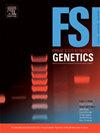开发和验证包含 232 个微单倍型的多重面板和用于法医亲属关系分析的软件。
IF 3.1
2区 医学
Q2 GENETICS & HEREDITY
引用次数: 0
摘要
在这项研究中,我们开发并验证了一种新的微单倍型(MH)面板,FGID微单倍型试剂盒,包含232个位点,专门用于法医亲属分析。该面板的性能通过严格的测试进行评估,包括灵敏度、物种特异性、抑制剂抗性、均匀性、稳定性、准确性和混合物反褶积。结果表明,该试剂盒能够以最小的DNA输入量可靠地检测所有基因座。对12种非人类DNA样品具有较高的物种特异性,对常见抑制剂具有耐药性。此外,法医统计分析显示,与标准STR面板相比,二人组和三人组的联合歧视力(cDP)为1-1.68e-223,联合排除力更强。该小组还对模拟和真实谱系样本进行了亲属关系分析测试,结果显示,在检测父母与子女、全兄弟姐妹、半兄弟姐妹和表亲之间的关系方面,可能性比(LR)显著提高,尤其是在传统STR小组难以发现的更遥远的亲属类型方面。将FGID亲属关系软件与MH面板结合使用,显著提高了亲属关系分析的准确性,即使是关系密切的个体也能得到有效的区分,同时减少了假阴性的数量。主成分分析(PCA)表明,该面板能够区分世界主要种群和东亚亚种群。综上所述,这些结果表明FGID Microhaplotype Kit和相关软件为法医亲属分析提供了一种高效、准确的解决方案,比传统的基于str的方法具有更好的鉴别能力和可靠性。本文章由计算机程序翻译,如有差异,请以英文原文为准。
Development and validation of a multiplex panel with 232 microhaplotypes and software for forensic kinship analysis
In this study, we developed and validated a novel microhaplotype (MH) panel, the FGID Microhaplotype Kit, which contains 232 loci and was specifically designed for forensic kinship analysis. The performance of the panel was evaluated through rigorous testing that included sensitivity, species specificity, inhibitor resistance, uniformity, stability, accuracy and mixture deconvolution. The results showed that the kit is capable of reliably detecting all loci with minimal DNA input. It showed high species specificity for 12 non-human DNA samples and resistance to common inhibitors. In addition, forensic statistical analysis revealed a combined discriminatory power (cDP) of 1-1.68e-223 and superior combined exclusion power for duo and trio cases compared to standard STR panels. The panel was also tested for kinship analyzes with simulated and real pedigree samples and showed significantly higher likelihood ratios (LR) for detecting relationships between parents and offspring, full siblings, half siblings and first cousins, especially for more distant kinship types where conventional STR panels have difficulties. Using the FGID kinship software with the MH panel significantly improved the accuracy of kinship analysis, allowing even closely related individuals to be effectively discriminated while reducing the number of false negatives. In addition, principal component analysis (PCA) showed that the panel can distinguish the major world populations and East Asian subpopulations. Taken together, these results suggest that the FGID Microhaplotype Kit and associated software provide an efficient and accurate solution for forensic kinship analysis that offers better discriminatory power and reliability than traditional STR-based methods.
求助全文
通过发布文献求助,成功后即可免费获取论文全文。
去求助
来源期刊
CiteScore
7.50
自引率
32.30%
发文量
132
审稿时长
11.3 weeks
期刊介绍:
Forensic Science International: Genetics is the premier journal in the field of Forensic Genetics. This branch of Forensic Science can be defined as the application of genetics to human and non-human material (in the sense of a science with the purpose of studying inherited characteristics for the analysis of inter- and intra-specific variations in populations) for the resolution of legal conflicts.
The scope of the journal includes:
Forensic applications of human polymorphism.
Testing of paternity and other family relationships, immigration cases, typing of biological stains and tissues from criminal casework, identification of human remains by DNA testing methodologies.
Description of human polymorphisms of forensic interest, with special interest in DNA polymorphisms.
Autosomal DNA polymorphisms, mini- and microsatellites (or short tandem repeats, STRs), single nucleotide polymorphisms (SNPs), X and Y chromosome polymorphisms, mtDNA polymorphisms, and any other type of DNA variation with potential forensic applications.
Non-human DNA polymorphisms for crime scene investigation.
Population genetics of human polymorphisms of forensic interest.
Population data, especially from DNA polymorphisms of interest for the solution of forensic problems.
DNA typing methodologies and strategies.
Biostatistical methods in forensic genetics.
Evaluation of DNA evidence in forensic problems (such as paternity or immigration cases, criminal casework, identification), classical and new statistical approaches.
Standards in forensic genetics.
Recommendations of regulatory bodies concerning methods, markers, interpretation or strategies or proposals for procedural or technical standards.
Quality control.
Quality control and quality assurance strategies, proficiency testing for DNA typing methodologies.
Criminal DNA databases.
Technical, legal and statistical issues.
General ethical and legal issues related to forensic genetics.

 求助内容:
求助内容: 应助结果提醒方式:
应助结果提醒方式:


